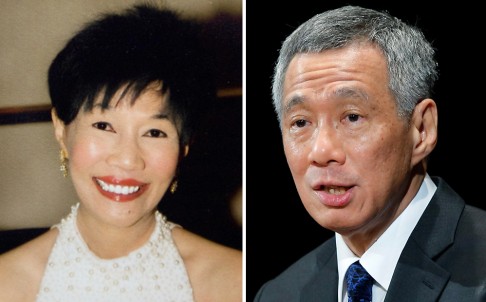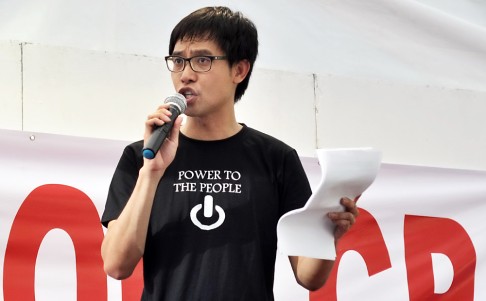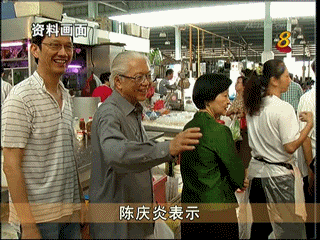-
IP addresses are NOT logged in this forum so there's no point asking. Please note that this forum is full of homophobes, racists, lunatics, schizophrenics & absolute nut jobs with a smattering of geniuses, Chinese chauvinists, Moderate Muslims and last but not least a couple of "know-it-alls" constantly sprouting their dubious wisdom. If you believe that content generated by unsavory characters might cause you offense PLEASE LEAVE NOW! Sammyboy Admin and Staff are not responsible for your hurt feelings should you choose to read any of the content here. The OTHER forum is HERE so please stop asking.
You are using an out of date browser. It may not display this or other websites correctly.
You should upgrade or use an alternative browser.
You should upgrade or use an alternative browser.
Project 2016: Vote out Lee Hsien Loong (SBF)
- Thread starter chonburifc
- Start date
- Joined
- Jul 14, 2008
- Messages
- 89,988
- Points
- 113
If you vote opposition, you can't be sure whether they will put the ordinary citizen's well being as their top priority.
You vote pappy you can be sure they won't.
Hence Vote Opposition Until PAP Becomes The Opposition. Then re-evaluate your options.
You vote pappy you can be sure they won't.

Hence Vote Opposition Until PAP Becomes The Opposition. Then re-evaluate your options.

Don't vote for Dr Kah Ch$ng Kang.
I am not a B team player get that into your head. :oIo:

- Joined
- Jul 14, 2008
- Messages
- 89,988
- Points
- 113
Only slightly better than Nemanja Vidic. 

I am not a B team player get that into your head. :oIo:
Only slightly better than Nemanja Vidic.
blah blah blah blah
- Joined
- Jul 14, 2008
- Messages
- 89,988
- Points
- 113
blah blah blah blah
"............... we will be Finished!"
- Joined
- Feb 13, 2013
- Messages
- 130
- Points
- 0
Vote out the pimp!
- Joined
- Oct 9, 2013
- Messages
- 168
- Points
- 0
- Joined
- Dec 21, 2012
- Messages
- 293
- Points
- 0
Like mother like son. Boh kah si
Singaporeans ‘no longer trust their government’: Writer Catherine Lim criticises PM in open letter
Singaporeans no longer trust their leaders, says writer Catherine Lim in open missive to Lee Hsien Loong that fuels social media debate
PUBLISHED : Monday, 09 June, 2014, 3:54am
UPDATED : Tuesday, 24 June, 2014, 3:04pm
Satish Cheney

Catherine Lim in open missive to Lee Hsien Loong. Photos: SCMP, EPA
An open letter to Prime Minister Lee Hsien Loong, written by one of Asia's most iconic personalities in the field of literature, is spreading fast on social media, with many leaving comments on her blog thanking her for speaking up while others are sceptical.
Dr Catherine Lim is a well-known and prominent writer in the region, having published numerous novels and collections of poetry and short stories as well as political commentaries.
Her books have been used in government schools for literature studies. The award-winning Singaporean writer was made a Knight of the Order of Arts and Letters by the French government and received an honorary doctorate of literature from Murdoch University in Australia.
In her open letter, she claimed that Singaporeans "no longer trust their government and the government no longer cares about regaining their trust".
Lim, who is in her early 70s, said there were clear signs of a trust issue. She cited the recent case of graffiti at a public housing block that was targeted at the ruling People's Action Party (PAP) as well as the rising number of protests and the increased online criticism, among other examples.
The Malaysian-born author said the government had put in a lot of effort to improve the lives of citizens but warned that the better-educated internet generation demanded more.
She heavily criticised Lee's recent defamation suit against Roy Ngerng, a young blogger who allegedly accused the prime minister of misappropriating state pension funds. While supporters say the defamation suit is crucial to ensure Singapore does not embrace a culture of slander and libel, critics insist it will harm the image and reputation of Lee and his party, especially since the case is being pegged as a David-vs-Goliath duel.
International rights advocates have often chided the Singaporean government for using the threat of defamation suits as a way of stifling opposing voices.
"When Mr Lee Kuan Yew liberally used the defamation suit against his critics, one of the reasons he gave (if I remember correctly) was that he wanted to punish them for implying government corruption, and thus eroding the trust of the people, which he said was necessary for the government to do its work," Lim wrote.

Catherine Lim heavily criticised Lee's recent defamation suit against Roy Ngerng (above). Photo: AFP
"Today, in a twist of supreme irony that would have incensed Mr Lee, Singaporeans see the defamation suit itself, and not the act that has entailed it, as the very cause of the erosion of trust.
"A few more applications of this once-effective instrument of control, even if legally justifiable, would surely damage the PAP cause further, in the highly charged atmosphere of the new Singapore."
Even though it won the 2011 general election, the PAP suffered its worst performance since independence in what many observers have termed a watershed election. Since then, the government has faced criticism from citizens complaining about overcrowded public transport, plans to bring in more foreign workers and the rising cost of living.
Over the years, Lim has written many commentaries addressing sociopolitical issues, surprising many with her bravado.
"Thank you Catherine for speaking up and sharing your view, for being an eloquent voice and for remaining constructive," said a blog reader named Markus. But while many left positive comments on her blog, some attacked her for writing the letter.
"If you think being a prime minister is so easy, why don't you go ahead and run for the position?" asked a commentator who posted his name as Jason Chua.
"It is easy to complain, complain, complain … but can't you see that the government is already doing its best?"
Lim is no stranger when it comes to ruffling political feathers. In September 1994, one of her controversial commentaries, "The PAP and the people - a great affective divide", was published by The Straits Times, the country's main English-language broadsheet. The op-ed piece claimed that while citizens respected the PAP, there was little affection towards the party.
Two months later she wrote another damning piece. The staunch PAP critic was then rebuked by the prime minister at the time, Goh Chok Tong.
In his book Conversations with Lee Kuan Yew, author Tom Plate, a former editorial director with the Los Angeles Times and acclaimed syndicated columnist, wrote: "By fax I asked him [Lee Kuan Yew] to offer some self- criticism.
"He referred me to Catherine Lim."
Similar threads
- Replies
- 15
- Views
- 835
- Replies
- 17
- Views
- 2K
- Replies
- 22
- Views
- 1K
- Replies
- 83
- Views
- 6K



